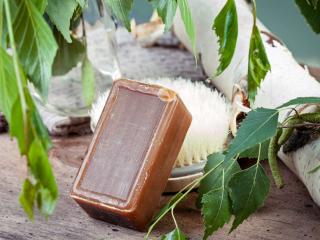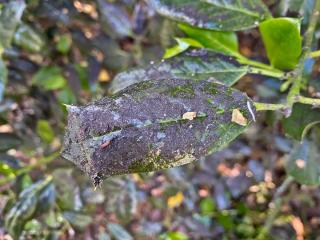

If you are a fan of natural and environmentally-friendly detergents and cosmetics products, you probably already came across black soap to maintain your home. But did you know that black soap is also very useful in the garden as an insecticide and fungicide? We will explain its different uses and dosages.

For black soap made from olive oil, the pulp is used, which includes the pits and residues from the olive oil extraction process. As for the difference in texture, it is related to the water concentration. The liquid version is therefore less concentrated in soap.
Similarly, black soap comes in two types: the version for household and garden maintenance, and the cosmetic version, among others, used in hammams for exfoliation.
Black soap and traditional Marseille soap have some ingredients in common, namely vegetable oil and salt. The difference lies in the agent that allows saponification. For Marseille soap, it is hardened by soda.
In the context of biological control against pests, black soap is a completely natural ally, recognized in organic agriculture. Simply because it has insecticidal properties.
Black soap allows you to effectively fight against aphids, scale insects, spider mites (which are actually mites), whitefly, caterpillars, and thrips.Black soap acts as a contact insecticide, meaning it clogs the pores of pests they use to breathe. Aphids and the like die of asphyxiation.
Totally harmless to plants, black soap can be used to combat pests on shrubs, roses, perennial plants, vegetables in the vegetable garden, fruit trees, and grapevines. Not to mention indoor plants!
To make black soap truly effective, it is essential to spray the upper and lower surfaces of the leaves, as well as the stems. It is better to intervene early in the morning and never in full sunlight. Avoid rainy days. In case of a severe infestation, the spraying can be repeated.To avoid black soap from killing beneficial insects, precisely target the areas or plants affected by the infestation.
To be used in case of a severe aphid or scale insect infestation and against caterpillars.Dissolve 3.5 to 10.5 ounces (100 to 300 g) of black soap, half a quart (0.5 liter) of rubbing alcohol, one tablespoon of lime, and one tablespoon of salt in 2.6 gallons (10 liters) of water. Dilute well and spray the solution undiluted.

To address this problem, it is necessary to treat the invasion of aphids and scale insects and then wipe the affected leaves, branches, fruits, and stems with a cloth soaked in lukewarm water and a few drops of black soap.You can also fight against downy mildew by mixing one teaspoon of black soap and 0.09 ounces (2.5 g) of baking soda in one quart (1 liter) of water.
Black soap is diluted to allow for better adhesion of treatment products against fungal diseases. By its action, the treatment preparation will be better dispersed and less washed away.For example, black soap can be added to Bordeaux mixture at a rate of 0.7 ounces (20 g) per quart (1 liter) (diluted at 2%).